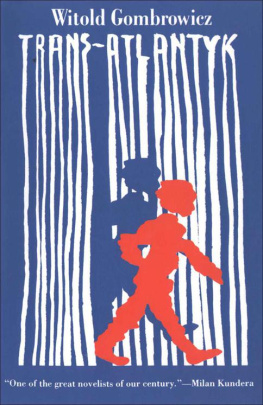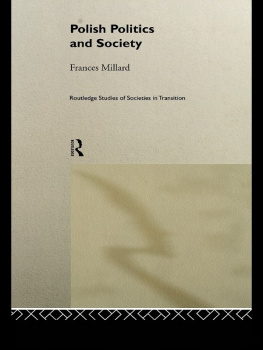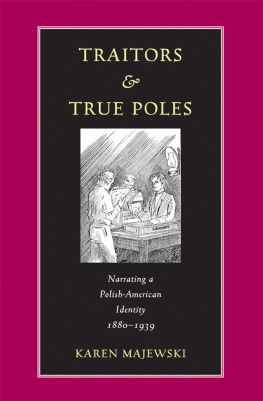Trans-Atlantyk
Trans-Atlantyk
Witold Gombrowicz
Translated by Carolyn French and Nina Karsov
Introduction by Stanislaw Baranczak

The publication of this book is supported by a grant from the Legion of Young Polish Women.
English edition copyright 1994 by Yale University. Polish edition copyright 1970 by Institut Littraire SARL.
All rights reserved.
This book may not be reproduced, in whole or in part, including illustrations, in any form (beyond that copying permitted by Sections 107 and 108 of the U.S. Copyright Law and except by reviewers for the public press), without written permission from the publishers.
Designed by Rebecca Gibb.
Set in Bauer Bodoni type by The Composing Room of Michigan, Inc.
Printed in the United States of America
10 9 8 7 6 5
Library of Congres
Cataloging-in-Publication Data
Gombrowicz, Witold.
[Trans-Atlantyk. English]
Trans-Atlantyk / Witold
Gombrowicz; translated by
Carolyn French and Nina Karsov;
introduction by Stanislaw
Baranczak.
p. cm.
ISBN 978-0-300-06503-9 (pbk.)
I. Title.
PG7158.G669T713 1994.
891.8537dc20 93-11880 CIP
A catalogue record for this book is available from the British Library.
The paper in this book meets the guidelines for permanence and durability of the Committee on Production Guidelines for Book Longevity of the Council on Library Resources.
This translation is dedicated to Szymon Szechter,
without whose encouragement we would not have persisted.
Contents
Introduction
A masterpiece of twentieth-century fiction and one of the most dazzlingly original works in all of Polish literature, Trans-Atlantyk would not exist had its author declined an offer to spend a few leisurely weeks aboard a pleasure boat. Almost exactly forty years have passed since the first Polish-language edition of this Argentinian novel by a Polish writer came outas if to make its own geographic unorthodoxy even more perplexingin Paris. Many of its readers have probably reflected on how the emergence of even the most accomplished work of a writer of genius may depend not so much on his or her creative intent as on an utterly trivial twist of fate.
In the case of Witold Gombrowicz, it was not a single accident but rather a random coincidence that made the creation of his masterpiece possible, albeit fourteen years after the voyage that inspired it. Gombrowiczs disembarcation in Buenos Aires on August 21, 1939, and the Nazi invasion of his homeland eleven days later recall the twin halves of one august event in Thomas Hardys The Convergence of the Twainanother masterpiece having to do with transatlantic liners. That Trans-Atlantyk was born from the marriage of something as grand as world war and something as minuscule as the authors ocean cruise does, however, have its own peculiar logic. These two unequal events have one thing in common: the ironic discrepancy between the individuals aspirations and the burden of obligations that ethnicity, national tradition, and ones chosen profession put upon ones shoulders. Both Gombrowicz and the novels narrator (who bears Gombrowiczs name) are concerned with the supra-individual notion of being a Pole or, more specifically, a Polish writer.
The transatlantic travel was not just a pleasure cruise: Gombrowicz the real-life author (Gombrowicz the narrator does not reveal much on this account) was invited abroad, all expenses paid, for a specific purpose. The trip was the maiden voyage of the ocean liner Boleslaw Chrobry, named after the first king of Poland in the eleventh century. Gombrowicz, along with another young author, Czesaw Straszewicz, was expected to represent (in particular to the sizable Polish migr community in Argentina) the culture of the Polish Republic, reborn in 1918 as a result of the world war. In the novel, as soon as the news of the German-Polish hostilities reaches Argentina, the expectations of Gombrowiczs compatriots change: instead of fulfilling his mission as an informal cultural envoy he is supposed to rush back home, arms in hand, to defend Poland against the enemy. Yet Gombrowicz, a sort of human synecdoche, is still expected to function as part of a whole, as a representative of something larger than himself: his nation, its indomitable spirit, and its literatures traditional role of making this spirit even more indomitable.
Gombrowicz the narrator refuses to comply, despite his casual acceptance of the peace-time mission (which, we may surmise, was just a convenient excuse to take a vacation abroad at the governments expense). His one-person mutiny may, of course, be attributed by some to simple cowardice, by others to an abhorrence of the essentially senseless bloodbath of war. Yet the truth is more complex. What Gombrowicz the narrator refuses to suffer any moretaking the dramatic yes-or-no question of his return as an opportunity to make a clean break with his half-hearted complianceis the overwhelming power of stereotype, of What Is Expected from You, of (to use the term that Gombrowicz adopted in his essays and diary) Form.
American readers of Gombrowiczs Diary will be familiar with this term, which denotes one of the two opposed pillars of his philosophy. Probably no other fiction writer in modern world literature can match the almost intimidating consistency and precision of Gombrowiczs system of ideas. The words philosophy and system contain no exaggeration: Gombrowicz the Philosopher, a selection of his essays published a few years ago in Poland, attests to the utmost seriousness and orderliness of the intellect of this seemingly whimsical and nonsensical writer.
The central and most original component of Gombrowiczs system is his vision of what he calls the interhuman church. This slightly puzzling term embraces the entirety of more or less ritualized or institutionalized (hence the metaphor of church) relationships bindingand/or pitting against each otherthe individual and others (both other individuals and society as a whole). According to Gombrowicz, by virtue of being human each of us is doomed to be part of the interhuman church: leaving it would be tantamount to renouncing ones humanity. Specific individuals relations to others may, however, vary widely, stretching from a tendency to comply with the prevailing stereotype of behavior to a striving for independence, spontaneity, and freedom.
The individual is, in other words, suspended between the external ideas of Form and Chaos, between total subordination of the ego to the generally accepted patterns of behavior, logic, language, and so forth, and total liberation from all that is inherited or imitated. If this dialectical dualism of Gombrowiczs thought proved so productive as the generating mechanism of each of his short stories, plays, and novels, it is for one reason: neither the extreme of Form nor that of Chaos is accepted unequivocally as a positive solution for the dilemma of human existence.
Such an acceptance can never happen in Gombrowicz, since he is fully aware that both Form and Chaos have disadvantages as well as advantages. Compliance to Form gives us something to lean on in our attempts to fit into this or that human community or group; by adopting that which is commonly shared within such a group, we gain access to its repertory of symbols, and that in turn enables us to communicate with others and to confirm our existence by means of its reflection in others eyes. On the other hand, the same Form that enables the individual psyche to express itself is also the psyches chief
Next page








